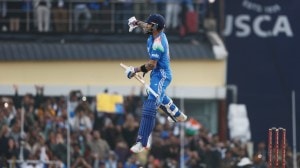Arjan Dhillon: The bard bringing Punjabi poetry to the people
A modern musician becomes the conduit for the giants of Punjabi literature, from Shiv Kumar Batalvi to Surjit Patar.
 From the verses of Batalvi to the ache of the diaspora, Arjan Dhillon soundtracks the soul of Punjab, past and present. (arjandhillonofficial/Instagram)
From the verses of Batalvi to the ache of the diaspora, Arjan Dhillon soundtracks the soul of Punjab, past and present. (arjandhillonofficial/Instagram)(Written by Maninderjit Singh)
Arjan Dhillon, a Punjabi singer, lyricist, and composer, has released two studio albums that reveal very different sides of his artistry. A for Arjan 2 is a contemporary collection, full of tracks that dwell on love lost and the ache that follows. But Shikhar is something else: an homage to Punjabi literature, where Dhillon sings the words of towering literary figures such as Shiv Kumar Batalvi, Surjit Patar, Tajammul Kaleem, Sukhwinder Amrit, Dr Jagtar, Deepak Jaitoi, and Sant Ram Udaasi.
Through his voice, music, and lyrics, Dhillon touches on themes central to Punjabi life and its diaspora, including love, separation, womanhood, migration, unemployment, and caste. Shikhar unfolds over seven tracks, each rooted in a distinct poetic voice.
Shiv Kumar Batalvi: The poet of eternal longing
 Shikhar unfolds over seven tracks, each rooted in a distinct poetic voice. (arjandhillonofficial/Instagram)
Shikhar unfolds over seven tracks, each rooted in a distinct poetic voice. (arjandhillonofficial/Instagram)
The album begins with Tu Vida Hoya (“Your Separation”) by Shiv Kumar Batalvi (1936–1973), often called the “Keats of Punjab” for his tragic intensity and exploration of heartbreak. Dhillon brings to life Batalvi’s lament of lost love, opening with: “Tu Vida Hoya Mere Dil Te Udaasi Chaa Gayi” (Since you have parted ways, a darkness has spread across my heart). His voice carries forward Batalvi’s reputation as the poet of eternal longing.
The second track, Hawa Banke (“Like the Wind”), draws from Surjit Patar (1944-2024), one of Punjab’s most celebrated living poets. Patar is known for blending emotional depth with philosophical reflection, and here he writes of a lover’s departure that feels both earthly and transcendent. The word hawa, wind, becomes a symbol of freedom, fleetingness, and the spiritual nature of human existence.
Deepak Jaitoi: Baba-e-Ghazal
Karman Walia Akhan (“Lucky Eyes”) comes from Deepak Jaitoi (1944–2012), affectionately remembered as Baba-e-Ghazal for his role in shaping the Punjabi ghazal. A British-Indian writer, Jaitoi meditates on the beloved’s eyes, first as radiant and fortunate, later as wells of grief. Dhillon’s rendition moves from passion to sorrow, echoing the tears that, in Jaitoi’s verse, flow like the Ganga and Yamuna rivers.
 In Kavita, Dhillon sings the words of Sukhwinder Amrit (b. 1963), one of the rare women whose voice has broken through in Punjabi poetry. (arjandhillonofficial/Instagram)
In Kavita, Dhillon sings the words of Sukhwinder Amrit (b. 1963), one of the rare women whose voice has broken through in Punjabi poetry. (arjandhillonofficial/Instagram)
In Kavita, Dhillon sings the words of Sukhwinder Amrit (b. 1963), one of the rare women whose voice has broken through in Punjabi poetry. (arjandhillonofficial/Instagram)In Kavita, Dhillon sings the words of Sukhwinder Amrit (b. 1963), one of the rare women whose voice has broken through in Punjabi poetry. The poem is a plea by a woman likening herself to a text—complex, misunderstood, but deserving careful interpretation. She asks her beloved to rewrite her with punctuation marks of care, affection, and love. By choosing to sing Amrit’s work, Dhillon performs a gesture of inclusivity, giving space to a woman’s voice seldom amplified in Punjabi music.
Din Te Gin (“Count the Days”) is the work of Tajammul Kaleem (1968–2012), regarded as one of Pakistan’s finest contemporary ghazal writers. Kaleem’s life was marked by poverty and illness, and he died too soon. His verses here are stark: “Din Te Gin, Main Mar Jaana E” (Count on the days, my end is near). For Dhillon to take up Kaleem’s words is significant—not only does it cross the tense border between India and Pakistan, it also restores dignity to a poet whose struggles mirrored those of many of his readers.
Dr Jagtar: The poet of meter and memory
Khat Likhi (“Do Write a Letter”) is by Dr. Jagtar (1950–2019), a poet admired for his mastery of rhyme and meter and for his politically conscious verse. His lyric recalls a time when handwritten letters sustained love: “Rishteyan Di Bheed Cho Fursat Mile, Ta Khat Likhi” (If from the labyrinth of human relations, you are able to make some time, pen a letter). Dhillon’s performance pulls the strings of nostalgia, evoking memory and intimacy.
The album closes with Pakka Ghar by Sant Ram Udaasi (1939–1986), a revolutionary voice in Punjabi poetry who wrote for the poor and marginalised. In the song, a daughter pleads with her father to find her a suitor with a house of concrete, a symbol of security denied to many women born into poverty. Dhillon, who shares roots in Barnala with Udaasi, delivers the poem with resonance, grounding it in lived reality.
With Shikhar, Dhillon has proved himself more than a singer of contemporary hits. He has revived voices that shaped Punjab’s literary imagination, ensuring that they reach listeners who may never have read them.
 His other album, A for Arjan 2, turns toward today’s struggles, especially those of migration. (arjandhillonofficial/Instagram)
His other album, A for Arjan 2, turns toward today’s struggles, especially those of migration. (arjandhillonofficial/Instagram)
His other album, A for Arjan 2, turns toward today’s struggles, especially those of migration. In Ranjha, Dhillon gives voice to the hardships faced by international students and workers abroad. In Heer, he reframes the legendary tale: “Har Ranjha Ghar Ni Chad Da Hunda Heeran Kar Ke” (Not everybody leaves like the famed Ranjha). Here, “Ranjha” becomes every individual who leaves home to build a better life, while their parents age in solitude. In the closing verse, “Ho Gaye Sir Chitte Jihna De (Those who have aged while we are away)”, Dhillon captures the helplessness of many families fractured by unemployment, political failures, and distance.
Together, the two albums form a portrait of an artist as curator and chronicler: someone who preserves Punjab’s past through poetry and mirrors its present through song. The flood of support from audiences across backgrounds suggests that his effort resonates deeply.
By setting the poets of Punjab to music, Arjan Dhillon has not only honored their legacy but ensured it survives, not only in bookshelves and anthologies but in the playlists and lives of listeners across the world.
(The writer is a Patiala-based teacher)


- 01
- 02
- 03
- 04
- 05





























